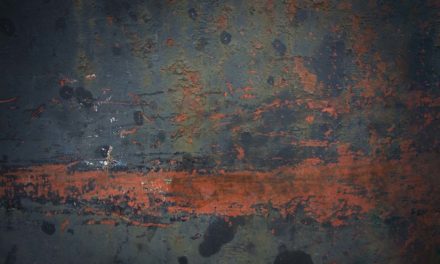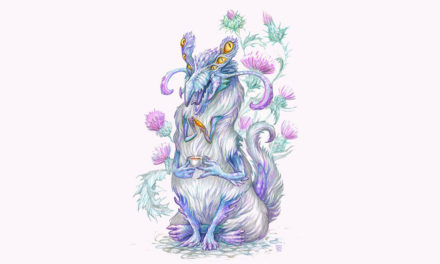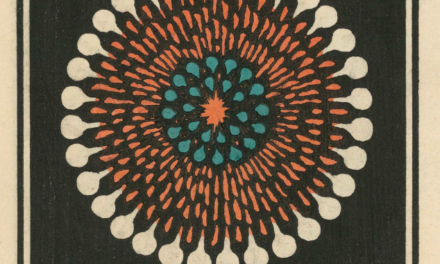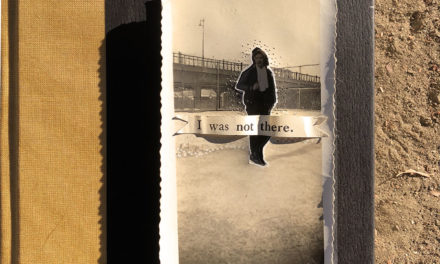Subject
by Morgan Melhuish
Issue 15: Superstition | 2,427 words
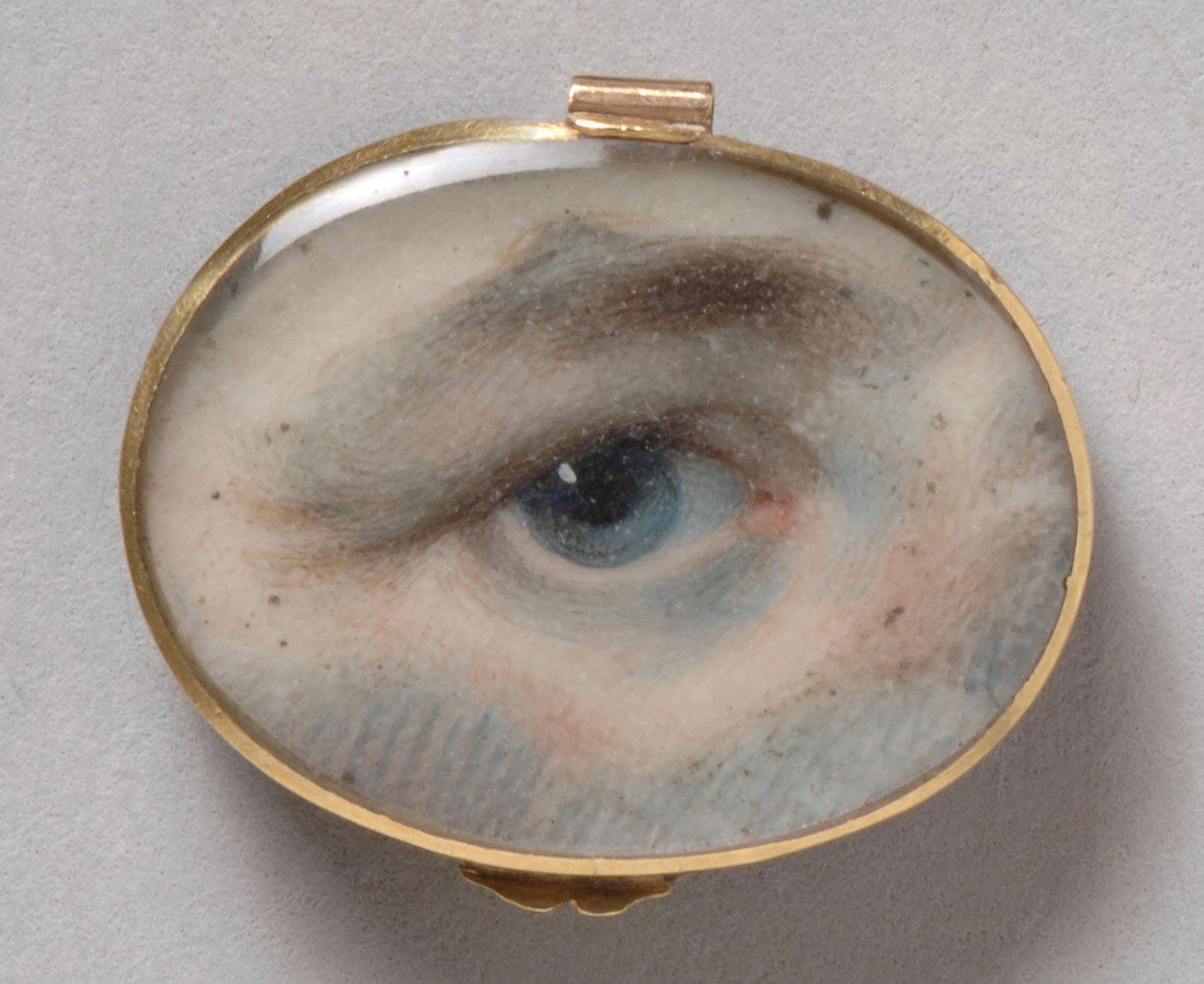
miniature eye. 1790–1810. Philadelphia Museum of Art
The first two rooms of the exhibition have animals as their subjects: chimpanzees, greyhounds, owls. They are twisted visions of feather and fur in Bacon’s usual nightmarish style. You decide it’s quite startling, to come face to face with primal primate rage, a monkey’s mouth mid-scream, lips splayed, teeth prominent, the work aping portraiture.
There is something unnerving too in this chimpanzee hung alongside a triptych of dissolving popes, the fine brushstrokes making it look like acid rain has attacked the oils, papal features an x-ray smudge. The veneer between the bestial and moral is thinner than canvas. You think it’s clever, how the arrangement of artworks invites comparison and provokes a social commentary larger than the individual pieces.
Now you sound like a pretentious hipster. You smile wryly to yourself and wonder how much you’ll get away telling Martin.
It’s too painfully obvious to someone like him, isn’t it?
He was the one to suggest you meet here, at his workplace. He left a ticket in your name at the front desk, a compliments slip instructing you to enjoy the exhibition and promising he’d find you.
You realise you’re fingering the folded paper in your pocket, caressing his scrawl. There’s an undeniable thrill, following the breadcrumbs he’s laid out, wondering if maybe he’s watching you even now. Looking about, there’s bored attendants, a prowling security guard, sexy in his uniform, obvious tourists, beard stroking posers fanning themselves with the exhibition catalogue.
Martin is nowhere to be seen.
You walk into the third room, the varnished wooden floor creaking under your shoes. In the middle of the far wall a large piece catches your eye. From this distance it is a doorway of marmalade light opened onto a savannah, a strange portal onto a prairie where a creature prowls. It draws you in. This artwork that no one else is looking at.
Amongst the impression of dried grass, you realise the creature isn’t some safari big five but a naked man, pale arse exposed, head turned from sight. Your mind wanders back to summer days, the smell of stale urine and sawdust, a circus you visited as a child.
You think of pictures you’ve seen online. Men collared and leashed on all fours, behaving like dogs.
There was a train manager you met who had a spare room kitted out with a cage. Although you turned down his invitation to crawl inside, you still think about what you might have had to do to earn release.
Even at Pride, amongst the rainbow flags and flimsy corporate merch, there were furries dressed like football mascots, bare chested boys in hoods and harnesses, leather men in leather chaps… You couldn’t help but stare, burning when one met your gaze, holding you ever so briefly, and winked. All of a sudden you felt the intensity of July heat, sweat erupting from pores, the intimacy amongst the crowd as he considered you. If only you’d said something, made a move, but in just a look he had paralysed you. He had seen you—something buried within.
In the painting there is a shady figure beyond the kneeling man: a lilac torso, the hint of a head. Even though there’s no definition, no eyes in the skull, face blended into the shadowy background, you can tell it’s watching.
He isn’t concerned with the crawling figure of the foreground. He looks directly at you.
Someone steps on your grave. Hair prickles upright on your arms, the back of your neck, a shudder breaks over your skin.
“Rick.” The voice startles you, but it is warm, and Martin sounds pleased to see you, rolling the r, a purr of a name. It isn’t yours, but that’s the one you use on the app. “Keep looking. Over there,” he commands, a finger directing your sight.
The painting is another beast, one with two backs. Again there is that indistinct quality, the blur of faces. The man on top pins down the one below: an arm crushes, hand grabs at a wrist, shins meet. The battered sheets tell a story of struggle and submission.
“What do you think?’” He lets you look. “Francis used to say we are our true selves when we are stripped back to basics, back to animals. Is it a load of bollocks? I’ve not made up my mind.” You can feel the heat of his breath at your neck, a literal weakness in your knees.
You never expected he’d be like this, among these people.
Your mouth is dry. You shift slightly, try to cough, to clear the knot you feel your tongue has twisted into.
He places his hand on your shoulder. The warmth, the pressure. It makes you think of the tangle of limbs before you. Then he’s spinning you.
“Let’s have a look at you then.” He regards you critically. “Far too many, what do they call ‘em… catfish, and pictures a decade old.” He tries to turn it into a joke, the twirl he makes you perform. He smiles like some Cheapside hawker with a dancing bear. Roll up, roll up and see his tricks…
Already you can feel the promise his profile suggested being upheld.
You might say he looks vaguely like a Jewish banker if pressed to guess. He wears a sharp silver suit, all origami angles. There is nothing remarkable about Martin, yet that’s part of the allure as far as you’re concerned.
“You’ll do, Rick.” He nods curtly, but there’s a twinkle in his dark eyes. You try to meet his gaze, to smile back, but you lose your nerve.
This time when Martin says your “name,” there’s a gently mocking tone, as if he knows it’s a lie, as if he intends to change it anyway.
Online you can sculpt a multitude of roles, every variation of Dom and daddy, boy and bitch, Master, sub, switch, slave…
Even now, he doesn’t know the person behind the paragraph of text, the pixelated pictures, though you stand right in front of him.
You don’t know him either. Yet you’ve come to the gallery, relinquished control, molded yourself to his command. It fills you with a frisson of arousal.
“The gallery will be closing in twenty minutes. Could all visitors start making their way out? Thank you,” a voice chimes from an unseen PA system.
“Ready to go behind the scenes?”
It is an invitation across a threshold. There is still time to back out, to return to the twilight outside.
You realise you’ve yet to speak.
“Sure.” You force the word out from somewhere within, and it sounds strangled, as twisted as the triptych forms in Bacon’s work, elongated necks and teeth in the wrong places.
What must he think of you?
He’s already turned, leading the way.
When Martin suggested meeting here it felt very resonant.
Of course you knew about Bacon, you’d done your homo-work.
The six degrees of Francis Bacon. It wasn’t until that film, Love Is the Devil, that you took notice of the artist.
Mostly you’d watched it to catch a glimpse of Daniel Craig’s cock.
But it fascinated you. The film’s central relationship. The burglar who Bacon… What?
Ensnared? Enchanted? Worshipped?
This man, George Dyer, an East London crook who broke in and then became Bacon’s lover, his tormentor. Turns out it’s just a story, that the couple just met in a bar. But the urban legend persists. Perhaps, like a profile, it’s reality written over with an ideal: the intruder who took more and more was given it all.
In the film there are scenes with cigarette burns and ropes, cries of pain and lust.
You can feel the sadomasochistic vibe oozing from the frames of his work even now, the push and pull of power.
As you watch Martin stride away you can’t help but wonder. Will he tell the story of how you met to other Masters? Don’t be so silly, you berate yourself. Don’t hope.
The invisible leash tugs at you. Keep up. Nothing will happen if you don’t follow.
You pass a portrait of George Dyer. A crouching gargoyle. No Dorian Gray, Dyer is poised to leap from a coffee table, blotched and swollen, a mangled slate-grey suit. His skin is tinged green like rotting meat, brutal features rearranged.
You shiver.
This is how Bacon saw his lover. A fascinating monstrosity he was enthralled by.
You want to linger but hurry past.
Martin nods to the security guard, two prowling tigers, before pushing open a door in the fabric of reality. That’s how it seems, this secret passage you’d been ignorant of, disguised with the ivy green paint of the walls, skirting board stuck to its base.
He ushers you through, making sure the barrier clicks into place. The corridor is wide and high, smooth concrete studded with oblongs of light every two metres or so. There’s no hint of the hubbub back in the gallery.
It is not what you expected.
Martin’s shadow stretches behind him in a dwindling strip.
Then there’s force and you gasp, momentarily disoriented. His lips find yours in an arc of stubble and chin, his kiss sharp as a palette knife.
“Here’s life.” He squeezes at your groin, and those shark-dark eyes bore into yours again.
There’s an oily taste in your mouth, some slimy residue that, when you wipe at your face, leaves a streak of vermilion on the back of your hand. At first, you’re shocked, thinking it is blood, but it has the greasy texture of heavily applied lipstick, like the Christmas kiss of an old aunt.
Martin’s cheek is a mess of colour, purples and crimson, streaks of brown.
“What?” Nothing makes sense to you.
“Shhh.” He leans in for another kiss, his body pressing you against the concrete wall so that you’re sandwiched between hardness.
You raise your hand, unsure if you’re going to struggle or caress him, capitulate or flee. Your fingers run through his flesh.
He pants and is paint, mouth smudged into a snarl.
You look at the… creature… this semblance of a man, recognition stirring. Look at your covered hands.
“Penny dropped?”
“You’re…”
“George Dyer. In the flesh,” he coughs. “Well sort of.”
He’s nothing like Daniel Craig, certainly not now, a troglodyte of pigment. No oil painting. It might be funny if it weren’t so unsettling, this masterpiece in a two-piece suit, half flesh, half abstraction.
“How?”
“Fucked if I know. Best guess? Old Franny captured something of my soul somewhere along the way. Never understood a thing he did, but they reckoned he was bloody good.”
Your mind is racing, trying to assimilate the information.
A memory stirs. “You took an overdose, didn’t you?”
He tuts. “Well I’m awake now.”
You can’t help but picture a queer purgatory that’s more salon-cum-sex dungeon: Mapplethorpe snapping shots of Tom of Finland, Bowery and Freud camping it up, Derek Jarman looking on, and with a knowing wink sipping cheap spirits. Then there’s George, out of place in the soirée, just a muse, just a bundle of rage, pummelling every weakness in the ether, birthing himself into the now.
“Then who’s Martin?”
“And who’s Rick?”
Touché. There is a pause between the two of you, your lie unmasked.
“Can’t kid a kidder.”
Dyer lunges forward and you flinch, thinking he’ll crack your skulls together, but instead he plants a sloppy kiss on your forehead, laughing at your squirming discomfort.
“You’re a pretty boy.” He inclines his head. “I’ll show you Martin, if you like?”
You follow him. What choice do you have? Sure, run along, scream the place down, hope someone finds you. Try to fight the intangible.
Yet you came with ideas of committing—to a night, to a scene, to a man, to more.
Never would you have dreamt of this, of him.
Dyer shows you through another door, flicks a switch, and overhead strip lighting flickers into life. The room is for storage, an archive perhaps?
Metal racks hold bubble-wrapped and plastic-covered frames. It is four or five degrees colder here, and your hot breath comes out in visible puffs.
Dyer strides down the length of the room, confident. He stands in front of a painting on an easel, looking it up and down.
“Martin. He’s in here now.”
You’re not sure what to expect. A smear of red and a face crying out in pain? An abstract version of a pre-Raphaelite cherub? A demonic David?
It just looks like one of the Bacons out in the gallery.
Saying “just” does it a disservice. The background is the colour of oats, but there’s little of that. The main focus is Dyer’s head, transformed of course, a brutal Quasimodo in a crisp white shirt and blonde jumper.
You laugh. It’s all been a joke, an elaborate hoax. Right?
Dyer doesn’t crack a smile. The messy part of his face, his cheek and chin, the right eye socket where your hand went, is the dead spit of the portrait.
“He was my first. And this is Tom.” Just behind you is another of the triptych.
“So there’s just one more canvas to go. Francis always had a thing about threes.” He lets the words hang in the void between you.
“The door’s not locked, but I reckon most people will be gone by now.”
You sink to your knees. You came here to submit. To a man, to more, to the inevitable.
It’s far too late now. You know the power he has, to claw his way back through the veil, the temper he had in life.
You feel his hands on your head.
There will always be men like Dyer—grasping, taking advantage. Ugly men we can’t resist. Beautiful beasts.
“Don’t let it hurt.” Your voice is hoarse, your heart in your throat, terrified of what is to happen.
You’re trembling but you let yourself be guided by those rough hands. So close to his groin and, despite yourself, you throb for his flesh.
There is colour and there is the absence of it. There is pain and pigment and oil, the rearranging of dimensions.
A flat line.
You are erased. A masterpiece.
You have given up your autonomy.
Even if you had a voice, what would you say to Dyer as he walks the length of the archive? He hasn’t even acknowledged the gift you’ve given.
He’s reached the far end now. With the flick of one finger, he plunges the room into darkness.
He has life, a soul. And you? You are art. Is that enough?

Morgan Melhuish
Morgan Melhuish (he/him) is a queer writer and educator from West Sussex. In 2025, his work is being published by the Slab Press, Graveworm Press, NonBinary Review, Sentinel Creatives, and Nine Pens Press. You can find him on X @mmorethanapage and on BlueSky under the same handle.

